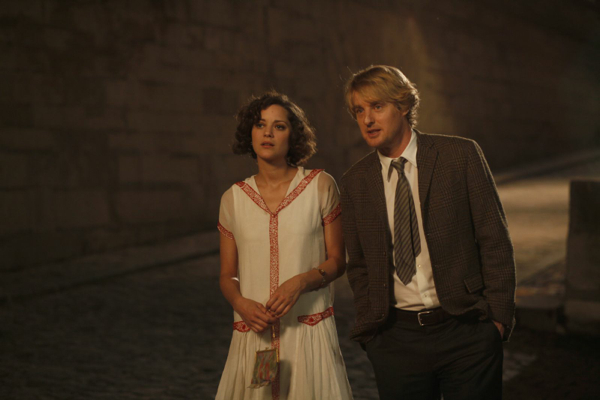Movie review by Greg Carlson
In one of the best jokes in “Midnight in Paris,” time-traveling romantic Gil (Owen Wilson) suggests a future plot to budding filmmaker Luis Bunuel decades before “The Exterminating Angel.” Confused by the premise, Bunuel repeatedly claims he does not understand why the dinner guests can’t just leave. Speaking slyly to one of the central thematic concerns of “Midnight in Paris,” the exchange is a moment for movie lovers by a movie lover, beautifully gift-wrapped by writer-director Woody Allen. The septuagenarian auteur, whose famous list of things that make life worth living in “Manhattan” name-checks musical, artistic, and cinematic heroes with heartfelt sincerity, conjures another set of cultural heavyweights this time, and the result is a sweet, wistful valentine to the City of Light.
A successful Hollywood screenwriter who dreams of deeper artistic fulfillment, Gil has come to France with fiancée Inez (Rachel McAdams) and her parents Helen (Mimi Kennedy) and John (Kurt Fuller), hopelessly uncultured xenophobes whose intolerance of their hosts reeks of superiority and entitlement. The ugly Americans browbeat affable Gil with mockery and disdain, affording Allen the opportunity to ridicule their materialism and regressive politics. A chance encounter with charismatic academic Paul (Michael Sheen, buttery and smug) sets up a series of social interactions for which Gil has no stomach. Taking leave of the group, Gil wanders the streets, and at the stroke of twelve, accepts a ride in a ghostly, vintage Peugeot that whisks him back in time.
Answering the old parlor game requiring participants to share their dream dinner companions, “Midnight in Paris” sets loose a nostalgist in the eye of the Jazz Age hurricane. Interacting with the likes of F. Scott and Zelda Fitzgerald, Ernest Hemingway, Gertrude Stein, and Salvador Dali, Gil wanders through his mind-bending evenings in a slack-jawed state of wonderment. Falling hard for Pablo Picasso’s current muse Adriana (Marion Cotillard), Gil begins to question whether or not he belongs in the 21st century, and Allen uses the complication to consider the flaws and fallacies of longing for a “better” past. The filmmaker has regularly applied a scalpel to the foolishness that results from “grass is greener” temptation, and few directors are as consistently proficient when blending misery and fortuity.
The visual contrast between the blindingly illuminated modern day scenes and the lush, golden-hued past highlights Gil’s increasing vexation with Inez, and if “Midnight in Paris” has a flaw, it is the way that McAdams is confined to a supercilious, easily dismissed character. Focusing instead on Gil’s great fortune, Allen smartly avoids any explanation of the “magic” that allows his protagonist to stroll between the years, a strategy that diverts viewer attention from any genuine issues that are bound to arise from canceling a marital engagement.
While Gil idolizes the Lost Generation, Adriana cites the Belle Epoque as her ideal, and when she and Gil find themselves in the 1890s hobnobbing with Henri de Toulouse-Lautrec and Paul Gauguin, Adriana confesses her own desire to remain in the vibrant fin de siècle time frame. Gil’s disappointment as he tries to convince Adriana that the Roaring Twenties can’t be topped initiates a realization – at least for the audience – that no matter the era in which we live, we pine for a past we cannot have.
